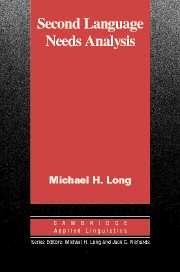Book contents
- Frontmatter
- Contents
- List of contributors
- Acknowledgments
- Overview: A rationale for needs analysis and needs analysis research
- I Methodological issues
- Chapter 1 Methodological issues in learner needs analysis
- II The public sector
- III The occupational sector
- IV The academic sector
- V Analyzing target discourse
- Index
Chapter 1 - Methodological issues in learner needs analysis
Published online by Cambridge University Press: 25 January 2010
- Frontmatter
- Contents
- List of contributors
- Acknowledgments
- Overview: A rationale for needs analysis and needs analysis research
- I Methodological issues
- Chapter 1 Methodological issues in learner needs analysis
- II The public sector
- III The occupational sector
- IV The academic sector
- V Analyzing target discourse
- Index
Summary
Introduction
In an era of shrinking resources, there are growing demands for accountability in public life, with education a particularly urgent case and foreign language education a prime example within it. Many secondary school students and, especially, adults with serious academic, occupational, vocational, or ‘survival’ needs for functional L2 proficiency, as well as their sponsors, are increasingly dissatisfied with lessons, materials and methodology developed for someone else or for no-one in particular. There is an urgent need for courses of all kinds to be relevant – and to be seen to be relevant – to the needs of specific groups of learners and of society at large. This is especially, but not only, true of advanced courses, which by definition (should) involve specialized instruction for specific purposes. General (language for no purpose) courses at any proficiency level almost always teach too much, e.g., vocabulary, skills, registers or styles some learners do not need, and too little, e.g., omitting lexis and genres that they do. Instead of a one-size-fits-all approach, it is more defensible to view every course as involving specific purposes, the difference in each case being simply the precision with which it is possible to identify current or future uses of the L2. This varies from little or no precision in the case of most young children, to great precision in that of most adult learners.
One of the ways in which foreign and second language educators have responded to the changing situation is by basing more of their courses on the findings of surveys of learner needs.
- Type
- Chapter
- Information
- Second Language Needs Analysis , pp. 19 - 76Publisher: Cambridge University PressPrint publication year: 2005
- 101
- Cited by



